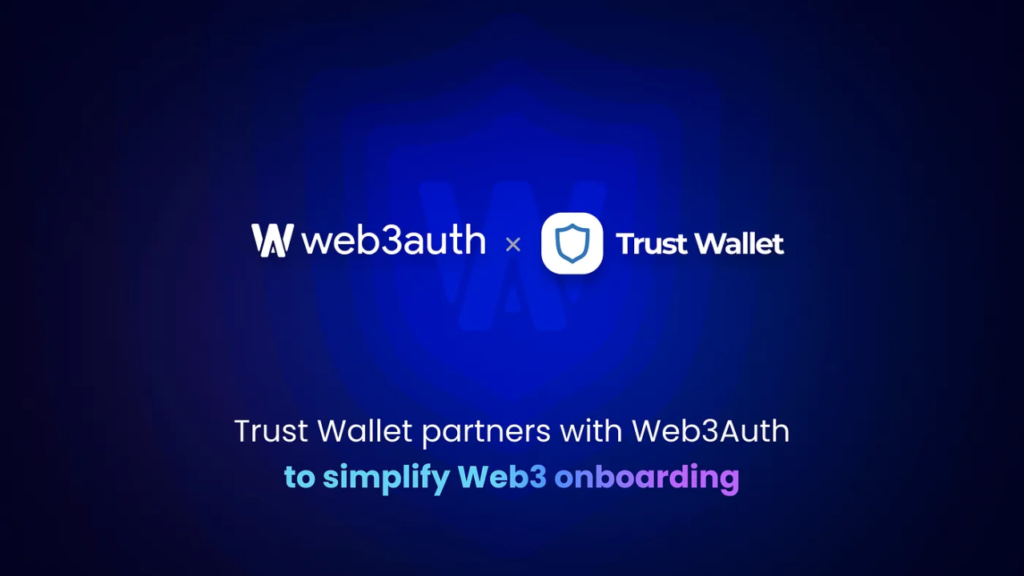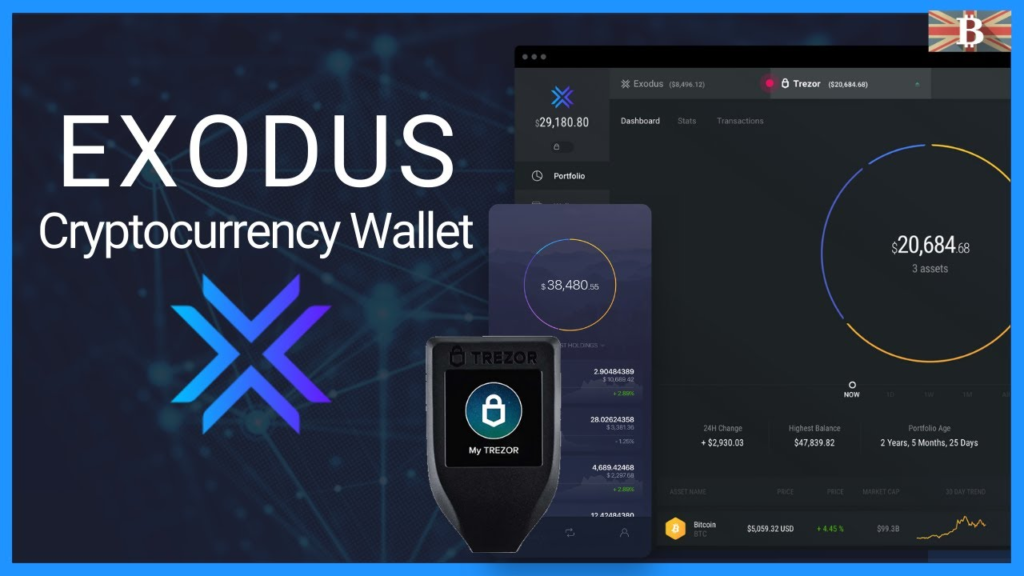The Exodus Passkeys Wallet allows users to set limits on transactions while ensuring that users have full control over their assets.

Exodus Passkeys aims to simplify Web3 onboarding primarily through its streamlined approach to managing private keys and interactions with blockchain applications. Here are some key ways it claims to achieve this:
- User-Friendly Interface: Exodus Passkeys provides a user-friendly interface that is designed to be intuitive and accessible, even for users who are new to blockchain technology. This helps reduce the complexity often associated with interacting with decentralized applications (dApps) and managing cryptocurrencies.
- Integrated Wallet Management: It integrates wallet management directly into the Passkeys system, allowing users to easily create, import, and manage their cryptocurrency wallets. This simplifies the process of securely storing and accessing digital assets.
- Centralized Private Key Management: Instead of users having to manually handle their private keys, which can be daunting and risky for newcomers, Exodus Passkeys manages these keys in a secure and centralized manner. This reduces the chances of users losing access to their funds due to mishandling of private keys.
- Single Sign-On (SSO) Experience: Passkeys offers a Single Sign-On (SSO) experience across multiple dApps and services. This means users can authenticate themselves and interact with various blockchain applications using their Passkeys credentials, without needing to create separate accounts and manage multiple sets of credentials.
- Security Features: It emphasizes strong security measures to protect users’ assets and data, including encryption and multi-factor authentication (MFA). This reassures users about the safety of their funds and personal information.
- Education and Support: Exodus Passkeys provides educational resources and customer support to help users understand how to navigate the world of Web3 and address any questions or concerns they may have.
Overall, Exodus Passkeys aims to lower the barriers to entry for individuals interested in participating in the decentralized economy by offering a simplified, secure, and user-friendly platform for managing their blockchain interactions and digital assets.
Certainly! Here are some additional details about how Exodus Passkeys simplifies Web3 onboarding:
- Cross-Platform Accessibility: Exodus Passkeys is designed to be accessible across different platforms and devices. Whether users are on desktop or mobile, they can access their Passkeys wallet and interact with blockchain applications seamlessly. This flexibility ensures that users can manage their digital assets wherever they are, enhancing convenience and usability.
- Interoperability with Multiple Blockchains: Passkeys supports multiple blockchains and cryptocurrencies. This means users can manage various digital assets within a single interface, eliminating the need for separate wallets for different cryptocurrencies. It also simplifies the process of switching between different blockchain networks when using dApps or making transactions.
- Integration with DeFi and NFTs: As decentralized finance (DeFi) and non-fungible tokens (NFTs) gain popularity, Exodus Passkeys integrates features that cater to these sectors. Users can easily participate in DeFi protocols, such as lending, borrowing, and staking, as well as engage with NFT marketplaces and collectibles, all through the Passkeys platform.
- Privacy and Data Control: Exodus Passkeys emphasizes user privacy and control over personal data. By managing private keys centrally and securely, it reduces the risk of private key loss or theft. Additionally, Passkeys allows users to maintain ownership and control of their digital assets without relying on third-party custodians, aligning with the core principles of blockchain technology.
- Community and Ecosystem: Beyond the technical aspects, Exodus Passkeys fosters a community-oriented ecosystem. This includes providing forums, educational content, and community support channels where users can learn from each other, share experiences, and stay updated on developments within the Web3 space.
- Continuous Improvement and Updates: Exodus Passkeys regularly updates its platform to incorporate new features, improve user experience, and adapt to changes in the blockchain landscape. This commitment to continuous improvement ensures that users have access to the latest tools and functionalities needed to navigate the evolving world of decentralized technologies.

Overall, Exodus Passkeys not only simplifies the initial onboarding process to Web3 but also aims to provide a comprehensive and user-centric platform for managing digital assets, interacting with blockchain applications, and participating in the decentralized economy.
Certainly! Here are some frequently asked questions (FAQs) about Exodus Passkeys:
1. What is Exodus Passkeys? Exodus Passkeys is a platform designed to simplify Web3 onboarding by providing a user-friendly interface for managing cryptocurrency wallets, interacting with decentralized applications (dApps), and securely storing digital assets.
2. How does Exodus Passkeys simplify Web3 onboarding? Exodus Passkeys simplifies Web3 onboarding by centralizing private key management, offering a user-friendly interface, providing single sign-on (SSO) across multiple dApps, and integrating with various blockchain networks for seamless asset management.
3. Is Exodus Passkeys secure? Yes, Exodus Passkeys prioritizes security with features like encryption, multi-factor authentication (MFA), and secure private key management. This helps protect users’ digital assets and personal information.
4. What cryptocurrencies and blockchains does Exodus Passkeys support? Exodus Passkeys supports a variety of cryptocurrencies and blockchains, allowing users to manage multiple digital assets within a single platform. This includes popular cryptocurrencies like Bitcoin (BTC), Ethereum (ETH), and others supported by the Exodus ecosystem.
5. Can I use Exodus Passkeys on mobile devices? Yes, Exodus Passkeys is designed to be accessible across desktop and mobile devices, providing a consistent user experience regardless of the platform.
6. How does Exodus Passkeys handle private key management? Exodus Passkeys manages private keys centrally in a secure manner, reducing the risk of key loss or theft for users. This approach simplifies the process of securely storing and accessing digital assets.
7. Does Exodus Passkeys support decentralized finance (DeFi) and NFTs? Yes, Exodus Passkeys integrates features that enable users to participate in DeFi protocols (like lending, borrowing, and staking) and interact with NFT marketplaces and collectibles.
8. Is there customer support available for Exodus Passkeys users? Yes, Exodus Passkeys provides customer support to assist users with any questions or issues they may encounter while using the platform. Support is available through various channels, including email and community forums.
9. Can I access educational resources through Exodus Passkeys? Yes, Exodus Passkeys offers educational resources to help users learn more about blockchain technology, digital assets, and how to navigate the Web3 ecosystem effectively.
10. How frequently does Exodus Passkeys update its platform? Exodus Passkeys regularly updates its platform to introduce new features, improve usability, and adapt to changes in the blockchain industry. Updates are aimed at enhancing the user experience and providing access to the latest tools and functionalities.
These FAQs provide a snapshot of what Exodus Passkeys offers and how it supports users in engaging with blockchain technology and managing their digital assets securely and conveniently.
One of the key features of Exodus Passkeys is its centralized private key management system. Here’s a detailed look at how this feature works and its benefits
Centralized Private Key Management
Overview: Exodus Passkeys centralizes the management of private keys, which are crucial for securely accessing and controlling cryptocurrency holdings on various blockchain networks. Instead of users having to manually handle and safeguard their private keys, which can be complex and risky, Passkeys securely manages these keys on behalf of users.

Key Benefits:
- Security: Centralized management reduces the risk of private key loss or theft, which can occur if keys are mishandled or stored improperly. Passkeys implements robust security measures, including encryption and multi-factor authentication (MFA), to safeguard users’ assets.
- Simplicity: Managing private keys can be intimidating for new users entering the world of cryptocurrencies and decentralized applications (dApps). Passkeys simplifies this process by handling key management behind the scenes, providing a more user-friendly experience.
- Convenience: Users can access their digital assets and interact with blockchain applications seamlessly through Passkeys, without needing to worry about manually importing or exporting private keys for each transaction or interaction.
- Integration: Passkeys integrates with various blockchain networks and supports multiple cryptocurrencies, allowing users to manage all their digital assets within a single platform. This integration enhances usability and interoperability across different blockchain ecosystems.
- Risk Reduction: By reducing direct user interaction with private keys, Passkeys minimizes the likelihood of human error leading to irreversible loss of funds. This includes accidental key deletion, exposure to malware, or phishing attacks targeting private keys.
- Compliance: For institutional users or those requiring strict compliance measures, Passkeys’ centralized private key management can facilitate adherence to regulatory requirements by ensuring secure and auditable control over digital assets.
User Experience:
- Seamless Access: Users can securely access their digital assets and participate in blockchain activities without needing advanced technical knowledge or extensive manual handling of cryptographic keys.
- Single Sign-On (SSO) Integration: Passkeys offers a Single Sign-On (SSO) experience across multiple decentralized applications (dApps), enabling users to authenticate themselves conveniently using their Passkeys credentials.
In summary, Exodus Passkeys’ centralized private key management feature enhances security, simplifies user interaction with blockchain technology, and provides a robust foundation for securely managing digital assets in the decentralized economy. This makes it particularly appealing to newcomers and experienced users alike who prioritize ease of use and security in their blockchain interactions.
Certainly! Let’s delve into the advantages and disadvantages of Exodus Passkeys’ centralized private key management:
Advantages
- Enhanced Security:
- Encryption and Security Measures: Passkeys employs strong encryption and security protocols to protect users’ private keys, reducing the risk of unauthorized access or theft.
- Reduced Human Error: By centralizing key management, Exodus Passkeys minimizes the potential for human error that could lead to the loss or compromise of private keys.
- Secure Authentication: Users benefit from secure authentication methods, such as multi-factor authentication (MFA), further bolstering the security of their digital assets.
- Simplicity and User-Friendliness:
- Ease of Use: Managing private keys can be complex and daunting for new users. Passkeys simplifies this process by handling key management behind the scenes, providing a more intuitive and user-friendly experience.
- Streamlined Access: Users can access their digital assets and interact with blockchain applications seamlessly without needing to manage or import private keys manually for each transaction.
- Convenience and Integration:
- Single Platform Access: Passkeys integrates with various blockchain networks and supports multiple cryptocurrencies, allowing users to manage all their digital assets within a single platform.
- Interoperability: Users can easily switch between different blockchain ecosystems and participate in decentralized finance (DeFi) activities or interact with NFTs without needing separate wallets for each.
- Compliance and Institutional Use:
- Regulatory Compliance: For institutional users or those needing to comply with regulatory standards, Passkeys’ centralized management can facilitate adherence to compliance requirements by providing auditable control over digital assets.
Disadvantages
- Centralization Concerns:
- Dependency on Service Provider: Users relying on Exodus Passkeys must trust the service provider to securely manage their private keys. Any breach or compromise could potentially expose users’ digital assets.
- Potential Single Point of Failure: If the centralized system is compromised or experiences downtime, users may temporarily lose access to their digital assets until the issue is resolved.
- Limited Control:
- Loss of Full Control: Some users may prefer to have full control over their private keys, as it aligns with the decentralized ethos of blockchain technology where users are responsible for their own security.
- Risk of Service Discontinuation: If Exodus Passkeys were to cease operations or discontinue its services, users might need to quickly migrate their digital assets to another platform or wallet, which could be disruptive.
- Privacy Considerations:
- Data Privacy: While Passkeys emphasizes security, users should be aware of the privacy implications of centralizing their private key management, including how their data is stored and accessed by the service provider.
- Adaptation to Changing Needs:
- Flexibility: Users with specific needs or preferences for decentralized applications (dApps) that require direct control over private keys may find Passkeys’ centralized management less suitable for their use cases.

In summary, Exodus Passkeys’ centralized private key management offers significant advantages in terms of security, simplicity, and integration across blockchain networks. However, it also introduces considerations regarding centralization, control, and potential dependencies on the service provider. Users should weigh these factors based on their individual preferences and needs when choosing a wallet solution for managing their digital assets.
ChatGPT
The bottom line on Exodus Passkeys’ centralized private key management is a balanced assessment of its benefits and potential drawbacks:
Benefits:
- Enhanced Security: Strong encryption and security measures protect private keys.
- Simplicity: User-friendly interface reduces complexity for managing digital assets.
- Convenience: Single platform access and interoperability across blockchain networks.
- Compliance: Facilitates adherence to regulatory standards for institutional users.
Considerations:
- Centralization: Dependency on the service provider for key management.
- Control: Loss of full control over private keys compared to decentralized solutions.
- Privacy: Potential implications of centralized data storage and access.
- Adaptability: Suitability may vary based on user preferences and specific blockchain application needs.
Ultimately, Exodus Passkeys’ centralized approach aims to simplify and secure the management of digital assets for a wide range of users, balancing convenience with potential trade-offs in control and decentralization. Users should evaluate these factors based on their priorities and comfort level with centralized management in the context of their blockchain interactions.
Exodus, a major software self-custodial wallet for cryptocurrency, is expanding its ecosystem beyond its platform with a new solution that allows users to integrate the wallet into any application.
Exodus Movement, the United States-based firm that created the Exodus wallet, on July 9 announced the launch of Exodus Passkeys Wallet.
The tool allows users to create and fund their embedded wallet directly in any platform or application, aiming to further boost Web3 onboarding and integration of decentralized applications (DApps). The new product can also be used as a standalone application, the announcement notes.
No need for seed phrases or verifications
With Passkeys Wallet, developers and users can create and fund an embedded wallet directly within the used application. According to the announcement, the process does not require users to fill in any seed phrases, browser extensions or email verifications, significantly simplifying the integration process.
“With just one click, users can create their wallet, or ‘Passkey,’ and seamlessly connect to an application, able to market-integrate in less than 10 minutes, with just a few lines of code,” Exodus co-founder and CEO JP Richardson said.
Exodus Passkeys Wallet allows transaction limits but still maintains self-custody
According to the announcement, the Exodus Passkeys Wallet is built using Multi-Party Computation (MPC) technology, which aims to enhance security by distributing private key control across multiple parties.
The Passkeys Wallet also expands user safety with features like spending limits while maintaining self-custody, the announcement notes.
Additionally, Passkeys Wallet uniquely supports Ethereum Virtual Machine (EVM), Bitcoin
$57,345, and Solana
SOL
$141, providing users with flexibility and access to diverse blockchain ecosystems and DApps.
Related: Consensys acquires Wallet Guard to enhance MetaMask security
Announcing the news, Exodus Movement mentioned that the waitlist for Passkeys Wallet is now live. Interested users are invited to sign up to be among the first to test out the new wallet using the link to the Passkeys Foundation.
Officially launched in 2016, Exodus is one of the most popular self-custody crypto wallets. It allows users to store crypto without intermediaries. The multi-chain wallet doesn’t require users to sign up for an account and supports more than 50 crypto networks.
Exodus, a major software self-custodial wallet for cryptocurrency, is expanding its ecosystem beyond its platform with a new solution that allows users to integrate the wallet into any application.
Exodus Movement, the United States-based firm that created the Exodus wallet, on July 9 announced the launch of Exodus Passkeys Wallet.






Leave feedback about this